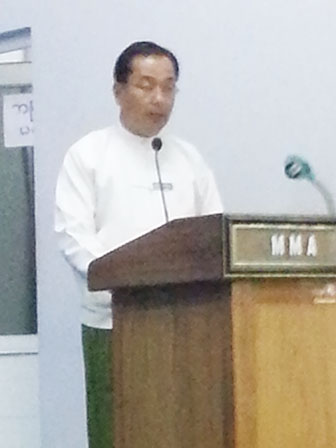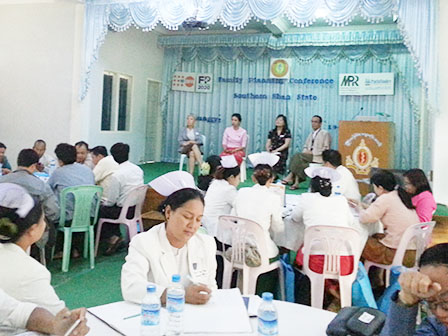During the first ever family planning best practices conference in Shan State on May 19 and 20, success stories inspired the audience. Dr. Than Min Htut, the Township Medical Officer in Pindaya, explained how he increased services in an under-utilized township hospital by 90% since 2001, with 991 safe deliveries in 2014.

This is a doctor who boosted the contribution of auxiliary midwives (AMW), whose conventional training was only six months, by making it possible for their training to be extended with another six months. The additional months included a hands-on training component to increase midwifery skill development, family planning counseling services as well as disaster preparedness. No less than 27 AMW were trained per year, and there are 81 AMW trained so far in Pindaya township.
Added to this, are monthly meetings with the AMW to provide continuous education to solve problems and to provide more information on common problems. As a result, women are no longer relying on traditional birth attendants but on (auxiliary) midwives. All of this led to antenatal care being increased from 78.9% in 2008 to 98.7% today. Outpatient as well as inpatient care also increased by 100-fold. Support of the community was key in Dr Than Min Htut’s efforts to increase services. In this, wealthy community leaders contributed to the cost of the hospital as well as transportation.
Shan State Social Minister, Dr. Myo Tun, in his opening address of the “Shan State Family Planning Best Practices Conference” expressed his thanks to UNFPA and Pathfinder International and other partners for bringing Basic health staff, obstetricians, gynecologists and partners together to share experiences and international best practices in Shan South Region. He assured that the Shan State government would do its best so that maternal mortality will decrease and contraceptive prevalence rate will increase in his region in line with women’s wishes.
Dr. Hla Hla Aye, Assistant Representative of UNFPA in her opening speech quoted principle 8 of the International Conference for Population and Development- Programme of Action, which states that “All couples and individuals have basic rights to decide freely and responsibly the number and spacing of their children and to have the information, education and means to do so.”

She also drew attention to Family Planning 2020, a global initiative which aims to enable 120 million more women and girls to use contraceptives by 2020 and to supports the rights of women and girls to decide, freely, and for themselves, whether, when, and how many children they want to have.
Myanmar committed to this initiative in 2013 and set ambitious goals to reduce unmet need of family planning from 19 to less than 10 percent and to increase the contraceptive prevalence rate to over 60 percent. Dr. Tin Maung Chit, reproductive health program analyst of the UNFPA country office presented on how 5.2 million US dollar worth of reproductive health commodities including contraceptives were procured in 2014 by UNFPA to support the people of Myanmar. He explained how integrated procurement planning is performed together with implementing partners including the Ministry of Health.
Dr. Hla Hla Aye emphasised this goal can only be reached if all development partners and the government increase investments in contraceptives, quality services and family planning counselling. It is also essential that the operational plan and key strategies are implemented with all other stakeholders pooling resources and that basic health staff are included in the effort to make these important goals a reality.


